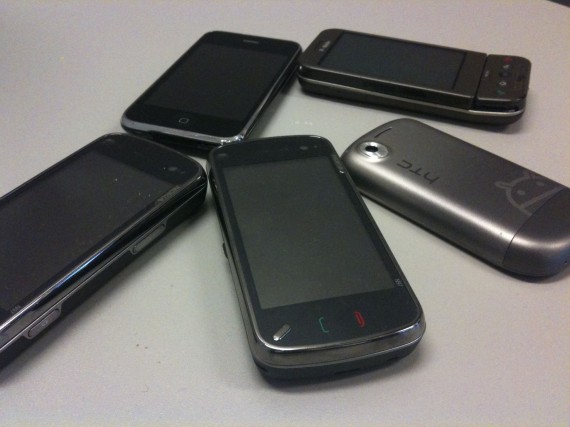White House: Unlocking A Cell Phone Shouldn’t Be A Crime
The White House is backing an effort to overturn a bizarre ruled recently enacted by the Library of Congress
Earlier this year, a little noticed rule change by the Library of Congress made it a violation of copyright law, potentially punishable criminally, for someone to “unlock” their cell phone by bypassing the carrier-specific settings, thus allowing the handset to access functions that some carriers choose to block. Within days of that decision, internet activists began reacting negatively to it, and an petition was started on the White House web site that has garnered more than 114,000 signatures so far. In response, the White House is now saying that the Administration will work to overturn the ruling:
The White House on Monday said consumers should be allowed to “unlock” their phones and tablets and switch wireless networks after their contracts run out without fear of breaking the law.
Most mobile gadgets contain software that prevents a smartphone user on, say, AT&T’s network from switching the device to run on a rival system. The blocks can be easily removed with programs that can be downloaded from the Web.
In January, the Library of Congress made unlocking a violation of a little-known provision of copyright law. Anyone who tried to do so could face criminal and civil penalties.
The decision quickly sparked an outcry from online activists. Taking to social media, blogs and the White House’s own protest forum, they collected over 114,000 signatures in just a few weeks.
In response, the Obama administration said it would support legislation to overturn the decision by the Library of Congress, which houses the U.S. Copyright Office. The White House also called on the Federal Communications Commission to intervene.
“It’s common sense, crucial for protecting consumer choice, and important for ensuring we continue to have the vibrant, competitive wireless market that delivers innovative products and solid service to meet consumers’ needs,” David Edelman, President Obama’s senior Internet adviser, wrote in a blog.
For now, cellphone unlocking remains illegal. But the quick response by the White House demonstrates how officials have become responsive to Washington’s emerging powerbase: Internet activists.
On several issues, such as an effort to crack down on Internet piracy last year, Web advocates have used grass-roots efforts and petitions to create locust like momentum for their agenda, government veterans say.
The unlocking issue “comes at a moment when everyone in the country is looking at Washington and saying they don’t seem to get anything done. And then you get a couple smart people who are passionately against a rule that the government adopts and through blogs and a petition get the White House to respond in 60 days,” said Blair Levin, a former FCC chief of staff during the Clinton administration.
Initially, very few policymakers took notice of the Library of Congress’s decision. In October, after a one-year review of the issue, the agency said it would make unlocking illegal beginning Jan. 26.
The problem, the agency argued, was that phones and tablets have copyrighted software, which must be circumvented to get to the codes that can unlock the devices. The only way to do it legally is to get permission from wireless carriers.
The quiet change in rules was soon discovered by some tech policy experts, including a 25-year-old former House Republican researcher, Derek Khanna, who wrote a critical article about the decision that was published by several online news outlets.
The piece went viral, and other activists took the matter to the White House protest forum, which requires a response from officials once a petition gets 100,000 signatures.
“This was a bipartisan effort, one that had Google’s Vint Cerf [company vice president and its ‘chief Internet evangelist’] in agreement with Tea Party Nation,” Khanna said. “This is about creating smart tech policy, and there are a lot of people out there who feel the same way.”
The New York Times reports that the Federal Communications Commission is also joining in on the White House’s call to reverse the ruling of the Library of Congress.
For those wondering, yes, it is apparently the case that the Librarian of Congress has rulemaking authority under certain aspects of the Digital Millennium Copyright Act, including the authority to make rules that essentially re-interpret the law to make a previously legal, at least in terms of the criminal law, activity illegal. Obviously, there’s a threshold question of whether or not this should even be the case. After all, if we’re suddenly going to expose, potentially, tens of thousands of people to criminal liability, shouldn’t that be something that elected officials have a say in before the rule is promulgated rather than afterwards? At the very least,this seems to be yet another example of the extent tow which our copyright laws have been become incredibly anti-consumer. After all, what can be more anti-consumer than telling someone that they could potentially go to jail for making a modification for a phone they purchased with their own money?
It’s worth noting, of course, that this White House effort would have no impact on any contractual provisions between a cell phone company and it’s customer that cover “unclocking” or “jailbreaking” a phone used pursuant to a contract between those two parties. Indeed, in most cases, it is considered a breach of the user’s contract to “unlock” the phone, but the people who engage in that activity are generally willing to do it in order to gain the benefits of being able to use programs on the phone that the carrier has blocked, or to use the phone overseas without having to pay the carrier’s charges for additional SIM cards. It strikes me that this is a fair trade between the parties in question, and that there’s really not any reason for the Federal Government to turn these people into criminals.
Here’s an interesting interview of David Khanna, who was behind the protests against the rule change, and Reason’s Nick Gillespie:







The EFF and others warned that the DMCA was all about this kind of thing from the beginning.
That said, roll-back is welcome.
(Phones under contract are actually time-purchase deals, and so honoring those is good form. I got my Android phone for “free” though it certainly had to cost a couple hundred to manufacture a cutting edge design. In 2 years it is/was paid for, and yes I should be free to unlock and do whatever.)
For those wondering, yes, it is apparently the case that the Librarian of Congress has rulemaking authority under certain aspects of the Digital Millennium Copyright Act, including the authority to make rules that essentially re-interpret the law to make a previously legal, at least in terms of the criminal law, activity illegal.
Of course he does. Why wouldn’t you want an expert in Russian history to make policy decisions about cellular technology?
This contents of this ruling have been repeatedly reported incorrectly, almost to the point that I’m beginning to suspect it’s being done deliberately.
The LoC ruling distinguished two different things: the first is “rooting” the phone to replace the provider installed software with software you provide. This is still completely legal, even though most of the coverage says it’s not. The second is “unlocking” which is reprogramming the radio to work with a different carrier.
If you want unlocked phones, you can buy them unlocked. The only phones this ruling covers are ones you get from a carrier at reduced price in exchange for a contract; and the carrier is already required to unlock it for you when the contract expires.
So the only people affected by this rulings are ones that want get a cheap phone and then skip out on the contract early or who don’t actually own the phone they’re trying to unlock. I don’t see why we need a law protecting their ability to run phone scams.
Let’s be clear. The DMCA locking cell phones was a feature, and not a bug. So some LOC functionary gets tagged with the “decision.” That is politics.
From the EFF’s early warning:
This “controversy” was a straightforward use of “anti-circumvention” language. No surprise.
In Brazil, South Africa and many other countries is the opposite: you can´t sell locked phones.
@Stormy Dragon:
That would be different (and would force all phone sales to separate hardware / service agreements. Maybe not a bad thing though.
The bad news is that your next phone costs $300, the good news is that any carrier will accept it.
What is most surprising to me is that the Library of Congress has rulemaking authority. I had no idea.
Well, really, none of the wireless companies actually do anything to go after those who unlock phones. When I used to work for AT&T customer service actually would provide an unlock code after a person had service for a period of time.
Mostly it’s about being able to use the phone overseas with a carrier, not taking it from one domestic carrier to another (most use different protocols. Can’t use a Verizon phone on AT&T)
@john personna:
I’d say it would be a very good thing.
Buying a $0 iPhone 4 will cost you at least about $2000 before the contract is over (which also makes the $200 the customer saves by not buying an iPhone 5 debatable, especially considering the second hand value of the two models.)
Also, I’d argue that customers seeing the non subsidized price of phones would bring down the cost of phones, and customers being able to pick and chose more easily between carriers would also bring down the cost of contracts etc.
Please also note, that this isn’t “Rule Making” in the strictest sense. The LOC is/was granting “exceptions” to the DCMA. What is being clouded over is the carrier unlock _exemption_ was not _renewed_.
@Stormy Dragon:
I don’t think that’s quite the case. It turns out that phones for which the contract period was over can now be blocked from unlocking if the carrier so chooses. So yes, it’s absolutely your phone to do with as you please except it’s not. Get it? Where it runs afoul of the DMCA is that to unlock your phone, you’ve got to bypass encryption. So it’s perfectly legal to unlock your phone but if you circumvent encryption to do this, it’s illegal. The carrier has to allow it to happen — Anyone else doing it is illegal. Or using quantum mechanics jargon, either state, locked or unlocked, is legally fine but the act of transitioning between states is disallowed. That Catch-22 is some catch, eh?
@Erik Berls:
+1 for clarifying comment
I welcome the White House to taking the side that Reason Magazine and Glenn Reynolds staked out a long time ago.
@john personna: Neitherof those things are particularly true. Most of the pphones we’re talking about will still cost more than that. And they won’t work with all carriers even if unlocked. Dragon’s comment is wrong, too. I’ll comment more when I’m at the computer.
@Trumwill Mobile:
With $200 i threw out a parts cost, underlying the “free” deal, and not the anticipated retail for an unlocked phone. With $300 I anticipated a competitive, Android-style, market.
The headline was: “iPhone 4S parts cost $188, study finds”
So, what did I get wrong exactly?
May be a while before I get to a computer. Basically, locked or unlocked Verizon won’t activate a phone that isn’t theirs or Altell’s. Most won’t work anyway because they run on an incompatible network. Ditto Sprint. The two that are in play are AT&T and T – Mobile, bother of whom use GSM networks and will let you use a phone that isn’t theirs. You may not be able to get full data speeds, though.
And Dragon is wrong about why someone would waNT to unlock their phone. Someone mentiined international travel. Also, hand-me-downs. I wanted to let my sister – in – law use my old GSM-compatible Verizon phone on AT&T and Verizon wouldn’t let me unlock the phone because I didn’t buy it with a contract. Even if this were not so, I don’t know that I want to trust a carrier I am leaving to make it easier to take my phone with me. And contract breach us what early termination fees are for anyway.
But because of compatibility issues, this isn’t as big a deal as it might be. Good for Obama regatdless, though I would prefer it if he forced Verizon to allow compatible phonesonto their nnetwork. I want to see third parties be able to enter the phone marketplace and allow them to make an ultra-compatible phone that I could take with me to any carrier. One step at a time, though.
@john personna: Go on Verizon and look. I can’t. Maybe my info is outdated, but last I checked most were in the $500 range without a contract. On the other hand, you can get some good discounts on ebay (even for new phones).
@Trumwill Mobile:
You seem to misunderstand my post. I was talking about a landscape with all “cheap phones with x-year service” contracts broken. I floated my anticipated vendor response.
Why do you think Verizon’s current plans, in the current landscape, would disprove possible futures?
(You might reasonably say a possible future feels unlikely to you, but it’s kinda hard to rationally say a possible future is “wrong” or some such.”)
Oh, if you’re talking about a dista@john personna: I did take your response as simething more than just a prediction, so I did misunderstand. However, I think we already have a glimpse by virtue of what T – Mobile is doing (monthly installment plans). I also find it exceptionallt unlikely that Verizon would change their entire network to allow people to port phones over even if we did have to by them outright. Which I do not believe we would because what Obama is proposing here is merely a return to what was the case before, where contracts breaking sid not affect the business model much at all due to termination fees, phone incompatibility, and the inconvenience of unlocking phones that will still only work with a limited number of alternatives.
@Trumwill Mobile:
Way to move the goal posts. “Carrier X won’t give me permission to use my unlocked phone on their network” is completely different from “Carrier X won’t unlock my phone now that my contract is expired”.
From C|NET:
@Stormy Dragon: On the first part, that wasn’t a response to you, it was noting that phone locking is nor the only obstacle to phonepportabilitybetween carriers. On the second part, I can only say what hhappened when I tried to do it. They asked why, I said it was for someone else, they said they ccouldn’t do it (I think because it was for someone who wasn’t an active customer.
Where I disagree with you is on the notion of why I would want to do it. I could be a former customer who wants to activate with AT&T. I could have bought the phone or been given the phone from someone else. Seems like they have the international thing covered kso long as you are current) but you are still dependent on their goodwill more generally for legitimate uses of unlocking. I’d rather not be and don’t think I should be when it is my phone. If broken contracts are an issue, deal with it through early termination fees.
What’s sort of funny about all of this, however, of course in the vein of tragic irony, is that many if not most of the same cadre of young, inexperienced and addled “activists,” who jumped like coiled springs into action over this issue, would in the very next breaths not have any particular knowledge of, much less objections to, the scores of onerous federal and state regulations with which businesses for decades have been saddled.
Mess with their iPhones and their Galaxy S4’s and there will be hell to pay. But point out to them that seven of the primary reasons why they’re stuck working at Starbucks, waiting tables or bagging groceries, are Obamacare, minimum wage laws, the high costs of workers’ comp. premiums, 8-hour day overtime laws, payroll taxes, COBRA subsidies, and …….. crickets.
C’est la vie.
In any case, a few other points are worth noting:
– There always are unintended and untoward consequences of government regulations. Perhaps at least some of these phone lock kids will learn that lesson and then be able to juxtapose it to other topics, e.g., income taxes, payroll taxes, unemployment taxes, environmental regulations, employment law regulations, wage & hour regulations, OHSA regulations, COBRA, HIPAA, Obamacare, etc.
– Copyright laws are a bitch. There needs to be substantial reforms. As in yesterday.
@Tsar Nicholas:
The phone (un)locking issue has nothing to do with copyright laws. It’s about encryption and perhaps what you’re allowed to do with a physical device you own.
Maybe you’re thinking about copying DVDs which is an issue about encryption laws trumping your right to make backups. Or perhaps about transcoding music or digitizing books between various formats which is mostly a copyright issue but perhaps one where good test cases might still be making their way through the courts.
Well, what I wrote above isn’t right… The problem was created by the DMCA was a side-effect of digital rights management and anti-circumvention.